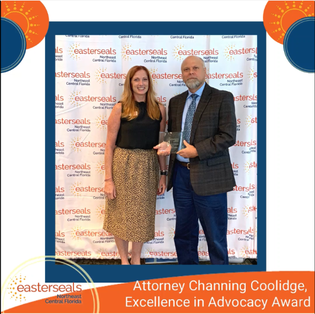 Bev Johnson, President/CEO presented Attorney Channing Coolidge, the Excellence in Advocacy Award at our annual meeting at the Brannon Center in New Smyrna Beach. "Channing is an advocate for Easterseals Northeast Central Florida in so many ways. I count on him to ask hard questions and talk through various situations that impact our operations. I know I can always pick up the phone and call him and he will thoughtfully and intentionally provide his thoughts. His insight is so very valuable and his passion for Easterseals' success is unparalleled."
7 Comments
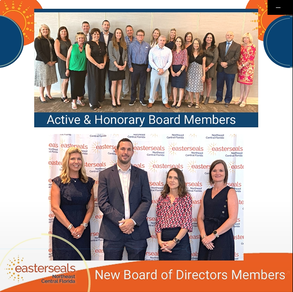 Easterseals Northeast Central Florida held our annual meeting at the Brannon Center in New Smyrna Beach this week to honor and recognize some of the best, hardest working staff, volunteers and clients in the world! We have one of the best volunteer boards in our area with a healthy make up of seasoned, long term Easterseals supporters and a new class of diverse volunteers with a fresh set of ideas and experiences to help drive us into the future. Lifetime Honorary Director Sheryl Cook had the privilege to introduce our Officers, Dr. Steve Sevigny, Chairman of the Board, Radiology Associates, Melissa Burt DeVriese, Chair-Elect, Security First Insurance, Paul Schandel, Vice Chair, Reames Employee Benefit Solutions, Ed Dimayuga, Vice Chair, Legacy Law, Holly Zitza, Treasurer, Cobb Cole. Nancy-Ellen Otte, Secretary, Century 21 Sundance Realty and Lauren Burkhalter, Immediate Past Chair, Morgan Stanley. We welcomed our New Board Members, Stephanie Benedict, Legislative Aide for Representative Tom Leek (District 25), Dr. Angie Gianini, pediatrician, Halifax Children’s Medical Center Clinics, Ormond and Palm Coast, Steve Mach, Director of Patient Services, Halifax Health and Ashley Leonhardt Lee, Vice President of Sales and Marketing, Tom Cook Jeweler, and celebrated our active and honorary board members in attendance. It is due to the officers’ excellent leadership and the commitment of the entire board that Easterseals is a thriving, growing and dynamic organization. 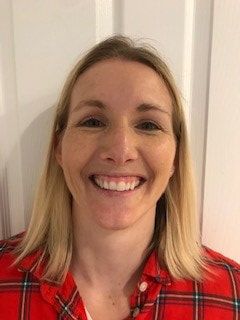 Kimberly Jackson, Occupational Therapist R/L Kimberly Jackson, Occupational Therapist R/L My name is Kimberly Jackson. I have 4 children. After working as a physical education teacher for 12 years, I went back to school to get my Masters in Occupational Therapy (OT). I have been an OT with Easterseals for 2 years. My primary responsibilities are completing evaluations and treatments for children to help them access their daily activities. I help clients and their families learn about self-care skills, classroom work, social interactions with peers, and play. It is our goal to increase their ability to accomplish these daily life skills. I enjoy the opportunity to develop creative and progressive treatment strategies, centered on a child's interests, to motivate them toward their goals. Every child has a variety of goals, challenges, fears and have various ways of being motivated. The team-focused environment at Easterseals provides the opportunity to share ideas and facilitate growth with our kiddos. The advantage to our clients is the ability to treat each child in a more cohesive manner to generalize skills from one discipline to another. Working with the team at Easterseals I have grown personally and professionally. My work environment has increased my observational skills during my evaluations. I am able to better analyze each child’s strengths and weaknesses. I also have become a better supervisor thanks to my tremendous COTA staff here at Easterseals. When people think about Easterseals, I hope they think of us as a caring community with a child centered mindset. Also, a place where their children feel safe and are excited to visit each week. 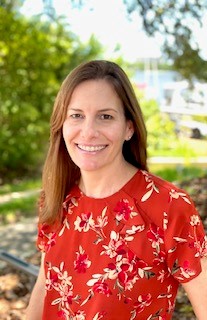 Susan O'Hanlon, Occupational Therapist Susan O'Hanlon, Occupational Therapist My name is Susan O’Hanlon. I have been an OT with Easterseals for 2 months. My primary responsibilities are to administer the Autism Diagnostic Observation Schedule-Second Edition (ADOS) as part of the comprehensive autism evaluation for the Autism Center of Excellence (ACE). I am also a contract occupational therapist through the Early Steps program where I complete the initial evaluations for eligibility and provide occupational therapy services in the natural environment. I enjoy educating families in ways to maximize their child’s potential and helping them see their child’s individual differences. The professional advantages of working in a team-focused environment are the consistent opportunities to learn and grow through the other professionals I collaborate with on a daily basis. The advantages to the families I serve is guiding them so they can feel confident as they navigate the challenges of autism and developmental delays. My professional goal after becoming an occupational therapist was to pursue a specialty in pediatrics. Easterseals has provided that opportunity. I enjoy learning from dedicated therapists across many domains such as school therapy, early intervention, outpatient therapy, and the Autism Center of Excellence. Since my early days as a school occupational therapist, I have sought opportunities to learn about Autism and now I have the opportunity to work in the Autism Center of Excellence. I believe the one thing most people don't realize is the ADOS administration is only a small piece of the autism assessment. There are many steps that need to be coordinated between the family and various professionals at Easterseals. When people think about Easterseals, I hope that people in the community recognize Easterseals as an organization that can provide resources to help children with special needs reach their greatest potential. 5/6/2021 Celebrating Mom! Easterseals former Ambassador Carolyn McGahan shares a loving tribute to the Advocate Mom that pushed her to always reach for the starsRead Now
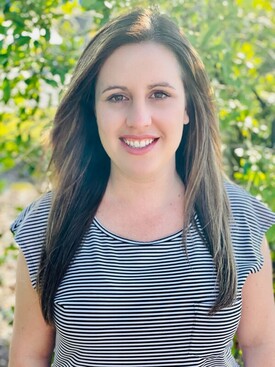 Gabriella Goeke, M.S., CCC-SLP Gabriella Goeke, M.S., CCC-SLP My name is Gabriella Goeke and I have been a speech language pathologist with Easterseals for two and a half years. I service clients in our Easterseals charter school and work in the Autism Center of Excellence. I provide evaluations as a part of a multi disciplinary team. I supervise our speech therapists during their clinical fellowship as well as provide resources for our classroom teachers, staff and clients. I enjoy the opportunity to educate and guide families through the assessment process. Working as a part of the multi disciplinary team allows me to see the child as a whole while giving valuable input regarding a child’s speech and language development. I believe when a child has a comprehensive evaluation, the parent can receive all evaluations for every area of development in one place which in turn saves them valuable time. I feel that everyday my skills as a speech language pathologist grow tremendously through continuing education and my everyday experiences in our Autism Center of Excellence and Charter School. I have received extensive training in the areas of articulation, language, feeding and oral motor therapies. I also learn so much from my clients and their families. As I educate them, they educate me as well and help me grow as a therapist. As a “speech therapist” most people think that I only work on helping children pronounce sounds/words. However, I am a speech-language pathologist and I do work on helping a child pronounce their sounds as well as supporting language development. When people think about Easterseals, I hope they think we are a place they can turn to in a time of need and uncertainty to gain answers and guidance regarding their child. I love my job as a speech language pathologist and I love coming to work everyday knowing that I am making a difference in helping children find their voice. One last thing I would say to parents, guardians and caregivers...Early intervention is key! If you have any uncertainty about the development of your child, don’t wait! We are here to help you and the earlier the better. You can reach Gabriella through Easterseals Specialty Clinic at 386-944-7800 or email [email protected]. 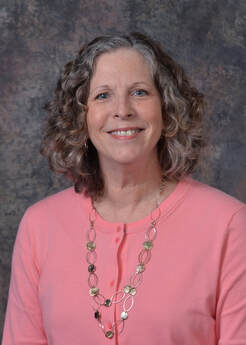 Debbie Neller, OTR/L, Clinical Coordinator, Autism Center of Excellence Debbie Neller, OTR/L, Clinical Coordinator, Autism Center of Excellence Debbie Neller is not new to Easterseals, but now as Clinical Coordinator of the Autism Center of Excellence, her primary role has shifted. She is responsible for administering the Autism Diagnostic Observation Schedule, and other supporting assessments, managing assessments and information for comprehensive diagnostic evaluation report, and overseeing diagnostic meetings with Easterseals' physicians as part of the Autism Center's Early Diagnosis Clinic. Debbie is a kind and patient clinician, and what she enjoys most about working with families through Easterseals is, "The opportunity to walk with families through a difficult moment, presenting information to them about their child in a compassionate manner." Debbie loves working in a team-focused environment and being able to easily access other professional opinions/observations. Gathering supportive strategies for families is also a key part of Easterseals' multidisciplinary approach to diagnosis. She says this is a true advantage for those we serve, noting, "Families are provided complete information about their child’s strengths and abilities as well as their areas of need in multiple areas of growth and development. Our comprehensive assessment is just that…..comprehensive! Although Debbie has practiced as an Occupational Therapist, mostly in the school system, the majority of her career, she says that her role as Clinical Coordinator for the Autism Center has given her professional growth opportunities. Debbie says, "I have a new appreciation for the uniqueness of each child. For their gifts and their unique challenges. I am challenged each day to creatively support the children and families I see. This job has expanded my perspective. I have learned much about myself, and my own challenges as it pertains to workplace interactions which is refining me both in my professional and my personal life." When asked to share insight from her personal experience that may help parents just entering their journey with Easterseals, Debbie reinforces this thought, "There is no perfect answer for some of our families’ challenges. They just are. Easterseals stands as a shelter and guide through the journey. I came to work for Easterseals because of my own special needs child who is now 26," and she approaches each family with a sincere desire to walk alongside them and help their child on a path to thrive, regardless of a diagnosis or delays. Even Debbie's daughter feels at home at Easterseals, "She feels it is an extension of our home, and she is proud to tell anyone where her mom works!" To chat with Debbie, you can reach her at [email protected]. Thank you for who you are, and all you do, Debbie! 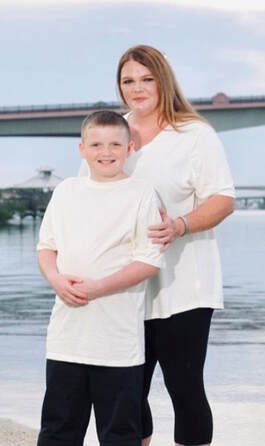 Jillian Overby is ending her second year as a lead teacher at Easterseals Charter School, where her role is to provide structured daily lessons in a supportive and caring environment to ESE charter students. Teaching is a love for Jillian, and she says she "really enjoys working with children in the pre-k age group (3-5 years old), we are fortunate to see large amounts of growth and change happen in a relatively short amount of time. A variety of services are provided in the charter classroom: pre-academic skills, social-emotional skills, speech therapy, and occupational therapy are just a few of the many services we offer.By having a team of experts in these fields providing complementary services, our students grow leaps and bounds very quickly!" Jillian says that our team-focused approach allows us to provide clear and meaningful supports to our families, noting, "Our charter classrooms are extremely team focused, and we meet regularly as a team to ensure our goals are cohesive for each individual student.Working so closely together gives me the unique opportunity to learn new things – nearly every day!Whether it is the speech therapist teaching me a new technique, or the IEP specialist helping me develop a new goal, there is the potential to grow as a professional every day." "I began collecting a printed certificate of every professional development opportunity I have completed since starting with Easterseals nearly two years ago.In this short time I have filled a one-inch binder with certificates and credentials. Without a doubt, Easterseals has provided me with more professional and personal growth than any other organization I have worked for," says Jillian proudly. Jillian really wants people to understand how deeply our childcare teachers care and the intentionality and planning that goes with helping children of all abilities achieve goals for lifetime success, "Some assume I only provide childcare services, and my job goes way beyond that. Each student arrives in my classroom with 3-6 individualized goals to work on. My biggest responsibility is ensuring my students are consistently working on these goals.I monitor and track progress, and I develop strategies for growth if needed. I provide our families with progress reports and data every four and a half weeks, at a minimum.Working in the charter classroom is paperwork and data heavy. I put forth 100% effort during EVERY minute I spent on the job." So glad you are on our front line, Jillian! Blue Jay Academy is an Academic School for students K-12th grade as well as summer camp programs. "Students will receive an education by teachers that show compassion, empathy and genuine concern for their well-being," says Lisa Eddy, DeLand Principal
|
Details
Archives
May 2024
Categories
All
|

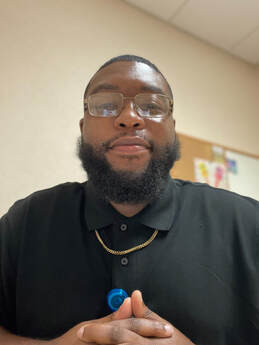
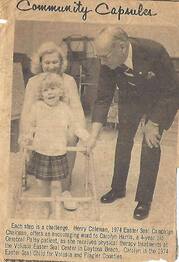
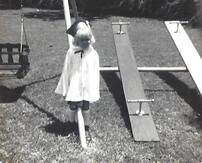
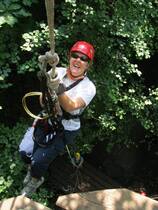
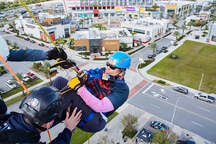
 RSS Feed
RSS Feed